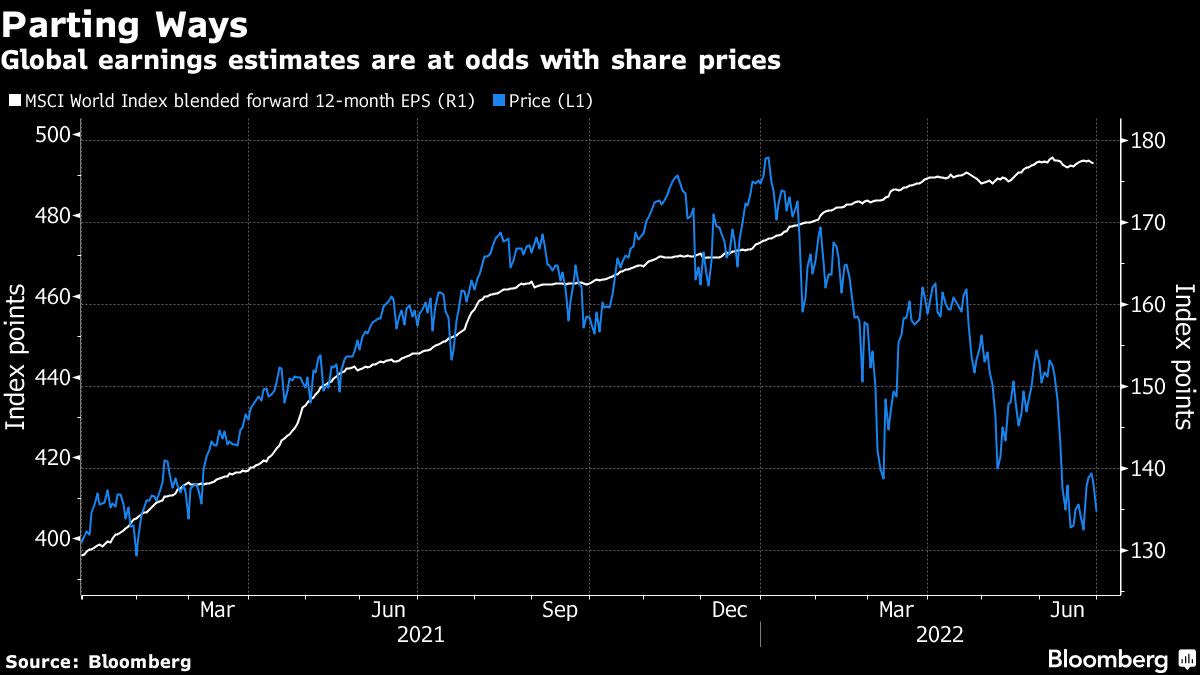
(Bloomberg) — Don’t let optimism among equity analysts fool you: Earnings forecasts are likely to be slashed as spiraling inflation and rising interest rates put the brakes on spending.
That’s the view from the latest Bloomberg MLIV Pulse survey, with 65% of 629 respondents saying analysts are “behind the curve” factoring in the damage.
The survey results — which skewed heavily toward people in the US and Canada, with 62% primarily based there, followed by 21% in Europe — echo warnings elsewhere that consensus estimates are too optimistic. Morgan Stanley’s Lisa Shalett has likened forecasters to “deer in headlights.”
“Analysts might have some catch-up to do in terms of thinking about economic growth,” said Anna Macdonald, a fund manager at Amati Global Investors Ltd. Many companies are set to face a downturn in demand, having only just restocked their inventories at higher prices due to supply chain disruptions, she said by phone. “The hit to corporate earnings could be quite rapid and quite extreme.”
It’s not just pros, though, who are pessimistic: a large chunk — 36% — of the survey respondents identified as retail investors.
If a recession indeed arrives, survey takers predict stocks may take a hit, with 57% seeing an economic contraction as a greater risk to equities over the next year than higher yields triggered by sticky inflation. Retail investors were the only group identified in the survey that worry less about recession than about inflation pushing yields higher.
That may partly be because the retail investors in the survey were predominantly based in the US and Canada, while Europeans were more concerned by recession than North Americans. Almost two-thirds of respondents in Europe, where the European Central Bank has yet to start raising rates, identified recession as a greater threat. In the US and Canada, that number was 55%.
Typically during a recession, S&P 500 earnings drop about 13%, according to Goldman Sachs. Within four quarters, they’ve usually only recovered by 17%, the bank’s strategists said in a note. Market rebounds are also slow, with the S&P 500 taking more than 1,000 days to recover from plunges during the dotcom and global financial crises, according to data compiled by Bloomberg. The bounce-back was faster during the Covid-19 pandemic, however.
According to strategists at Sanford C. Bernstein, 12-month forward earnings in US and Europe have risen 7% over the past six months. The MSCI World equity index, meanwhile, has plunged more than 20% as economists like those at the Organisation for Economic Co-operation and Development slashed growth forecasts.
Though they remain largely optimistic, equity analysts are becoming more cautious on earnings. An index from Citigroup Inc. tracking weekly estimate revisions has been mostly negative for the past four months. And strategists at JPMorgan Chase & Co. last month cut estimates for large-cap US technology firms.
Away from stocks, meanwhile, MLIV Pulse survey respondents are still relatively upbeat on the dollar’s prospects, even after the US currency’s recent strength. Some 35% of respondents said the Bloomberg Dollar Spot index will rise in the third quarter versus 24% who think it will fall.
Respondents to the April MLIV survey predicted the dollar index would continue rising. Since then, it’s gained about 5% as the Federal Reserve became more aggressive on rate hikes.
The dollar should “remain on a stronger footing” as high inflation persists, Derek Halpenny, MUFG Bank’s head of European global markets research, told Bloomberg Television.
©2022 Bloomberg L.P.